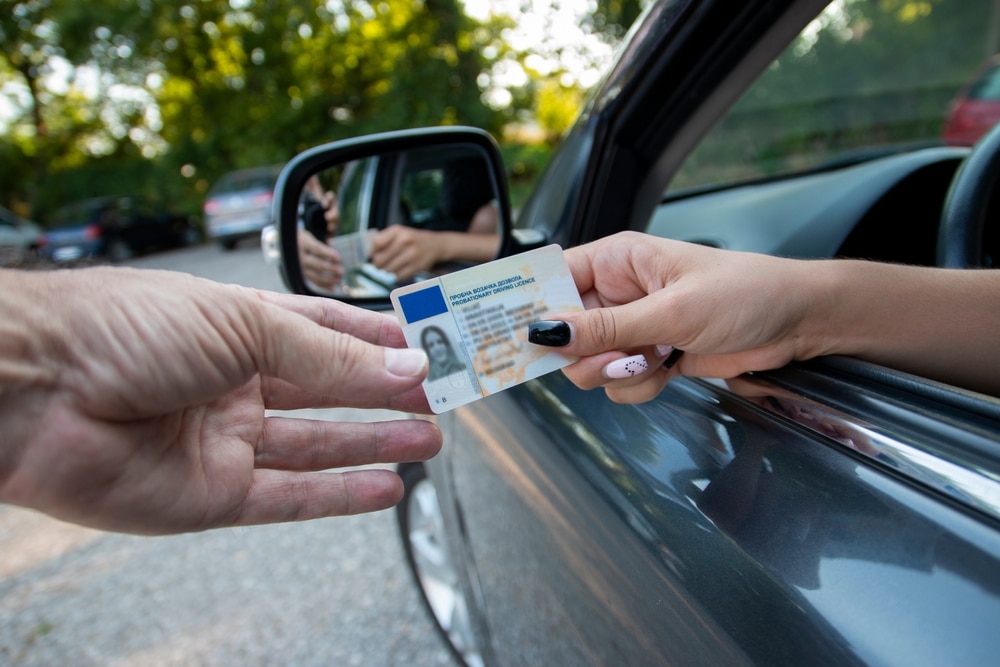
You need a driver’s license to lawfully operate a motor vehicle in Florida. Your license must remain in good standing. The Florida Department of Highway Safety and Motor Vehicles (FLHSMV) notes that the state operates a graduated “points” system of demerits for drivers. As the FLHSMV describes it, “you may earn points against your driving record, which, when accumulated, may cause your license to be suspended.”
It is reasonable for drivers to be concerned about getting points. Too many points on your record will not only cost you money, but they could also lead to the loss of your license. How many points can you get? How long do points stay on your record? What are the worst offenses? Within this article, our Fort Lauderdale car accident lawyer answers these questions and more by explaining the most important things you should know about how long points will stay on your license in Florida.
Table of Contents
- How Long Do Points Stay on Your License in Florida?
- What are the Most Common Traffic Violations that Impose Points on a License?
- How Do Points-Based License Suspensions Work in Florida?
- What to Know About the Driver Improvement Class of Florida?
- How Many Points Does Driving School Take Off My Record in Florida?
- Do Criminal Traffic Offenses Result in Points on My License in Florida?
- What Happens if I Settle the Fine from My Traffic Ticket?
- What Happens if I Do Not Pay My Fine for My Traffic ticket?
- Do Driver’s License Points Affect Your Insurance Premiums?
- Can Points on Your Driver’s License Influence Your Car Accident Case?
- How to Get Points Off Your License in Florida?
- Why Hire BK Law For a Car License-Related Case?
- Get Help From a Driver’s License Attorney in South Florida
How Long Do Points Stay on Your License in Florida?
How long do penalty points remain on your license in Florida? Here is what you need to know:
- Points from Florida Tickets: If you received a ticket within Florida—whether from the local police or state police—any penalty points will remain on your driver’s license for three years (36 months). The three-year period starts from the date the driver pays the fine. If they take the matter to court, the three-year period starts when the case is adjudicated.
- Points from Out-of-State Tickets: Did you get a citation from another state? That state will share the information with FLHSMV. You will be issued penalty points in accordance with Florida’s state standards if the offense you committed in the other state is also an offense in Florida. Once again, the penalty points on your license will remain there for three years.

What are the Most Common Traffic Violations that Impose Points on a License?
If you were issued a traffic ticket/traffic citation, you are certainly not alone. According to comprehensive research from the Bureau of Justice Statistics (BJS), nearly 15% of licensed drivers in the United States report that they have been issued a traffic citation in the last 12 months. Traffic violations come in many different forms. Here are some of the most common traffic issues that impose penalty points on a driver’s license in Florida:
- Speeding (Three Points): Speeding is the most common traffic violation. The Federal Highway Administration (FHWA) cites data showing that 41 million speeding tickets are issued nationwide each year. Speeding is a three-point violation in Florida.
- Too Fast for Road Conditions (Three Points): You can be cited for going too fast even if you are below the speed limit. Under Florida law (Florida Statutes § 316.183), it is unlawful to drive faster than a speed that is reasonably prudent for road conditions. Drivers must adjust their speed for weather and traffic flow. This is a three-point violation.
- Unsafe/Improper Backing Up (Three Points): A significant number of car accidents happen when people are reversing. A driver who backs up unsafely or improperly can be cited for a three-point violation in Florida.
- Running a Red Light (Three Points or Four Points): Running a red light is either a three-point offense or a four-point offense in Florida. A driver who blows through a steady red light and makes a left turn will face a four-point penalty.
- Stop Sign Violations (Three Points of Four Points): Stop sign violations are also either three-point offenses or four-point offenses based on specific circumstances. Going through a stop sign with no attempt to stop and then turning may be a four-point violation.
- Failure to Yield (Three Points): Motorists must properly and safely yield, including to other vehicles, bicyclists, and pedestrians. In most circumstances, failure to yield is a three-point penalty violation for drivers in Florida.
- Reckless Driving (Four Points): Reckless driving is the operation of a vehicle with willful or wanton disregard for safety. It is a criminal violation that is a second-degree misdemeanor as a baseline. Reckless driving that causes severe bodily harm is a serious felony offense. It is also a four-point violation in Florida.
- Careless Driving (Three Points): Careless driving is the operation of a motor vehicle without the appropriate care and prudence. It is less serious than reckless driving. It carries three penalty points in Florida.
- Leaving the Scene of an Accident (Six Points): All drivers involved in a crash must stop their vehicle, remain at the scene, and exchange information—with an exception for medical emergencies. Leaving the scene of an accident is a criminal violation. It is also a six-point demerit offense in Florida.
- Failure to Stop for a School Bus (Four Points): School bus safety is of the utmost importance. Drivers need to take additional safety precautions near school buses. Failure to properly stop for a school bus is a four-point violation in Florida.
- Child Car Seat Violations (Three Points): Florida has car seat laws in place to help protect vulnerable young children. A parent, caregiver, or another responsible party that violates car seat regulations could be cited for a three-point penalty offense.
How Do Points-Based License Suspensions Work in Florida?
Penalty points on a driver’s license are cumulative. That is to say that a driver who has too many penalty points on their record will face a points-based license suspension. Here is a basic overview of how points-based driver’s license suspensions work in Florida:
- 12 Points Within the Last 12 Months: An automatic 30-day driver’s license suspension.
- 18 Points Within the Last 18 Months: An automatic 90-day driver’s license suspension.
- 24 Points Within the Last 36 Months: An automatic one-year driver’s license suspension.
What to Know About the Driver Improvement Class of Florida?
Florida has a specialized process in place to allow motorists to avoid the assessment of penalty points in certain circumstances. As noted by FLHSMV, some drivers who have received a traffic citation may be eligible to take a four-hour driver improvement class. If you are eligible to take a class for a particular offense—such as running a red light—there are several benefits, including:
- Withholding of the adjudication; and
- No assessment of penalty points upon completion.
How Many Points Does Driving School Take Off My Record in Florida?
Zero. Florida law is very clear: You cannot use driving school to take points off of your record once they have already been assigned. Instead, qualifying motorists may be able to take an FLHSMV-approved driver education course to avoid getting penalty points put on their record in the first place. A driver cited for a traffic violation must be proactive.
Do Criminal Traffic Offenses Result in Points on My License in Florida?
It depends entirely on the traffic offense. For example, a DUI charge carries no potential penalty points in Florida. However, a conviction for drunk driving will almost certainly result in the suspension of a driver’s license on its own. However, other criminal traffic offenses—including reckless driving and leaving the scene of an accident—do carry penalty points.
To learn more, schedule a free consultation with us today.
What Happens if I Settle the Fine from My Traffic Ticket?
You will get points assigned to your license. In Florida, paying a traffic ticket is the legal equivalent of admitted guilt. That is not to say that it is the wrong approach in every case, but a driver needs to understand the implications. If you pay a fine, points will be added to your license that same day.
What Happens if I Do Not Pay My Fine for My Traffic ticket?
Not paying a traffic ticket in Florida is a big mistake. It is not a good strategy to avoid points. Here is the problem: Florida can (and will) suspend your license if traffic fines go unpaid for too long. If you are caught driving with a suspended license, you can be arrested and charged with a criminal offense. To add to those problems, you will still owe the original fine amount along with fees.
Do Driver’s License Points Affect Your Insurance Premiums?
Yes. Car insurance providers in Florida can charge more to policyholders based on their history of points on their licenses. Indeed, this is exactly what will happen in most cases. According to data from Value Penguin, just four penalty points on your driver’s license in Florida will raise your auto insurance premiums by an average of 44 percent. It is a high additional cost.
Can Points on Your Driver’s License Influence Your Car Accident Case?
Yes. Florida is a no-fault car insurance state for minor and moderate collisions. An initial claim for an injury is generally through a motorist’s own Personal Injury Protection (PIP) policy. However, fault always matters for property damage claims and for serious injuries. Points assessed in reality to a specific case will have an impact on liability. On the other hand, pre-existing points—for example, a speeding ticket from two years earlier—should not have a direct impact on your car accident injury claim, even though those points will still show up on your record.
How to Get Points Off Your License in Florida?
If a traffic ticket has been issued, there are only three ways to get—or more accurately in some cases, keep—points off your license in Florida. First, you can challenge the citation. If you are found not guilty of the offense, no penalty points will ever go on your record. Second, you can enroll in an approved driver improvement program. This is an option for some offenses that is available a maximum of one time per 12 months. Completing the class can keep points off of your record. The third option is time. Points will only stay on your record for 36 months in Florida.
Why Hire BK Law For a Car License-Related Case?
Car accident claims are complicated—particularly so when they involve allegations of a traffic violation or the potential of points being imposed on someone’s license. At Bernheim Kelley Battista, LLC, we help clients and their families get real justice and real results. Our firm is proactive. Among other things, our Fort Lauderdale personal injury lawyer is prepared to:
- Conduct a free, in-depth review of your license-related car accident case;
- Investigate the incident—gathering all of the documents, records, and evidence you need;
- Advise you on your legal rights and legal options;
- Represent you in any settlement negotiations; and
- Develop a strategy to help you get the best results.
Get Help From a Driver’s License Attorney in South Florida
At Bernheim Kelley Battista, LLC, our Fort Lauderdale auto accident lawyers are standing by, ready to protect your rights. If you have any questions about traffic violations and car crashes, we are here as a resource. Contact us today to set up your free, no-obligation initial consultation. With a law office in Fort Lauderdale, we help clients get real justice and real results throughout Florida.
Personal Injury Practice Areas
Car Accident
Truck Accident
Uber Accident
Scooter Accident
Bicycle Accident
Boating Accident
Medical Malpractice
Wrongful Death
Slip and Fall
Construction Accident
Jet Ski Accident
Workers Compensation
Catastrophic Injury
Pedestrian Accident
Pool Accident
Premises Liability
Bus Accident
Motorcycle Accident
Dog Bite Accident

